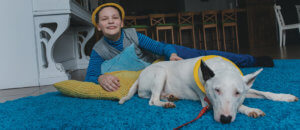Pets For Health

Having a pet is more rewarding than you think – your furry friends can help improve your health too
As a nation, we’re pet mad. Last year, a survey showed that a whopping 45% of Brits owned a pet, with 26% owning a dog and 18% owning a cat. But it’s not just their cute, doe eyes and endless tail wagging that makes them so popular. The truth is, whether we realise it or not, owning a pet is actually improving our health.
Exercise
If you have a dog, you’re already fitter than if you didn’t have one – because no matter what the weather, or how terrible you’re feeling, your dog doesn’t care and just wants a nice long walk through a muddy field!
Fitness instructor Claire Turner, who runs Mind.Body.Kind in Tring, has gone one step further and created fitness classes with dogs.
‘I trained as an animal physiotherapist, and know that dogs need just as much attention and exercise as humans to stay happy and healthy,’ she says. ‘People tell me they get home from work and have time to walk their dogs, but no time for exercise as well. So I decided to do something about it.’
Claire created Press-ups and Pooches, Whippets into Shape and HIIT and Hounds – three fitness classes designed with dogs in mind. She says: ‘We start with a warm-up where people jog round the field with their dog and do star jumps, which the dogs always love joining in with!’
‘People don’t realise they’re working so hard because the dogs provide so much entertainment and distraction.’
As well as getting her clients fitter, the classes give the dogs and their owners real time to form an even closer bond.
‘Spending this time with them where they can have fun makes both you and the dog feel closer,’ she says.
Feel Good
There’s nothing better than the feeling when you walk through the door and your faithful friend bounds up and welcomes you. The same goes for cats who curl up on your lap and give you a cuddle. The very act of stroking and cuddling pets releases the feel-good hormone oxytocin in our bodies – the same one triggered by laughter – and make us feel happier and more relaxed.
Reduce Stress
Having a pet can reduce levels of the stress hormone cortisol in our bodies, which in turn helps reduce blood pressure. It’s amazing to think that a little cuddle can do so much for your health!
Company
One in 20 people in the UK admit to feeling lonely, according to a survey by the Office for National Statistics (ONS) in 2016-17. Owning a pet can provide much-needed love and affection, as well as someone to talk to, as many people admit to talking to their pets. A dog in particular can help you make new friends too – out on walks, at training classes or even the pet shop – meeting other like-minded people can stop you feeling so isolated.
Detect Illness
A dog’s sense of smell is extremely powerful, and increasingly they’re being used to help people with life-threatening illnesses manage their conditions.
Dogs are trained to detect the smallest changes in blood sugar levels of a diabetes patient and, if the levels fall too much, they can alert them to the danger of a hypo, as well as get help and fetch medical supplies.
Dogs are also being trained to detect the very early signs of other illnesses, including cancer and seizures. Our pooches really are amazing!
Dogs and Children
 Dogs have proven to be an amazing help for adults and children with special needs and disabilities.
Dogs have proven to be an amazing help for adults and children with special needs and disabilities.
As well as being a companion, they can give practical help, aid with physio, and be a real confidence booster.
‘With the explosion in autism diagnoses in recent years, the focus has been on assistance dogs for children with autism,’ says Maddy Phelps from Dogs for Good, based in Oxfordshire. ‘Dogs can help children with autism feel calmer, feel more able to communicate – the changes can be astounding.’
The charity has found it impossible to keep up with demand, so is now offering advice for people looking to get a dog to help with an autistic child.
‘An assistance dog takes a long time to train and costs £20,000 for the lifetime of the dog,’ explains Maddy. ‘We’ve found it helpful to offer workshops to teach people how to train their own dog, or to decide whether they should get a dog.’
The workshops help families decide if a dog is suitable for them, and if so, which breed. ‘Everyone has different needs,’ Maddy explains. ‘We teach about dog behaviours and training, and give advice on ways dogs can help. For example, for an autistic child, deep pressure is very calming, so we teach them how to train their dog to rest its head in a child’s lap, or even to give pressure to the whole body.’
So far the charity has helped more than 1,000 families this way, and hopes to do more.
- Go to Dogs for Good www.dogsforgood.org for more information and advice
Claire Turner runs Mind.Body.Kind.Canine classes in Tring, and in parks near the Tring School.
claire@mindbodykind.uk. www.mindbodykind.uk
